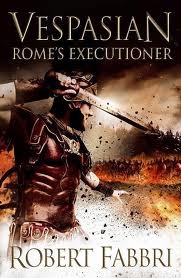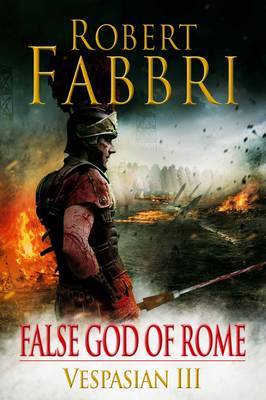Author interview with Robert Fabbri
 In my search to find more interesting read I came across the books of Robert Fabbri and his Vespasian series. I have always enjoyed a good Roman fiction story and his series proves to be just that. Telling the tale of young Titus Flavius Vespasianus and his rise through the ranks in the military. But what makes this series quite different is that it started of in a way that I haven't seen before, from the birth of Vespasianus, and hereby Robert Fabbri gives this story quite a unique and most interesting start, and showed Vespasianus in a more than relatable way when he had his hardships. So far I have read the first book and I am hooked so far. It has great references to the Rome of old, the political intrigue and backstabbing that you know and above all some magnificent large and small scale battles.
In my search to find more interesting read I came across the books of Robert Fabbri and his Vespasian series. I have always enjoyed a good Roman fiction story and his series proves to be just that. Telling the tale of young Titus Flavius Vespasianus and his rise through the ranks in the military. But what makes this series quite different is that it started of in a way that I haven't seen before, from the birth of Vespasianus, and hereby Robert Fabbri gives this story quite a unique and most interesting start, and showed Vespasianus in a more than relatable way when he had his hardships. So far I have read the first book and I am hooked so far. It has great references to the Rome of old, the political intrigue and backstabbing that you know and above all some magnificent large and small scale battles.
So far the series consists of four books:Tribune of Rome published 2011, Rome's Executioner published 2012, False God of Rome published last January 2013, and soon to come Rome's Fallen Eagle this January 2014. but if you continue reading you know that Robert Fabbri has a lot more in store for you!
Author bio:
Robert Fabbri was
born in Geneva in 1961. He was educated at Christ’s Hospital School, Horsham
and London University. He worked for twenty-five years as an assistant director
in the film and television industries.
Having had his fair share of long, cold nights standing
in the rain in muddy fields and unbearably hot days in deserts or stuffy sound
stages he decided to start writing.
Being a life-long ancient war-gamer with a collection of
over 3,500 hand-painted 25mm lead soldiers and a lover of Roman Historical
Fiction the subject matter was obvious.
-------------------------------------------------
Hi Robert, welcome to The Book Plank and for taking you
time to answer these few questions.
BP: First off, could you give us a short
introduction of who Robert is? What do you like to do when not writing, your
likes/dislikes?
RF: I started
writing five years ago to escape from my old career. Writing now takes up
nearly all of my time. When I’m not working I read, watch films, travel, drink
Merlot and sleep very well.
BP: Writing a book is hard, but perhaps
writing a story based on history and fiction can be even harder. When and why
did you decide that you wanted to write Roman fiction?
RF: In the
sleeve notes for Under the Eagle by Simon Scarrow it said that “Simon decided
to write the sort of book that he would want to read”. That struck a chord with
me back in 1999 as I was looking for a change of career. I thought about it,
researched various ideas and then sat down at the kitchen table at 1100 on 8th
February 2008 and started.
BP: After getting experience with your debut
Tribune of Rome, have you been able to use anything you learned in writing it
in your subsequent books?
RF: I know
that I’m my harshest critic so I make sure that I’m always looking over my
shoulder as I write, to check that I’m not boring myself and not repeating
myself.
BP: The Vespasian series currently stands at
three books with the fourth one to be published in January 2014, has the series
turned out the way that you wanted it to be? Or would you, if you were given
the chance, rewrite certain parts?
RF: So far
it’s turned out roughly how I imagined it; nothing is ever going to be exactly
as the writer plotted it because you can never allow for what your characters
might do – they often turn left when you expect them to turn right! I don’t
think that I would rewrite much if I had the chance; however there are some
sentences here and there that could be tidier and perhaps the first couple of
parts of book 1 could be tightened.
BP: The Roman history is rich in many
magnificent characters. How did you decide that you wanted to focus your story
on Titus Flavius Vespasianus? Had you considered other characters as well?
RF: To me
Vespasian was always the outstanding subject but I did look at others.
Vespasian’s life stands out because during his career he served in almost every
part of the empire with the exception of Hispania. Rome, Thrace, Cyrene, Germania, Britannia,
Africa, Greece and Judaea each provide a different backdrop to successive
books. The fact that he survived the reigns of Tiberius, Caligula, Claudius –
in the form of his wives and freedmen – and Nero and went on to win a civil war
and become emperor is a feat in itself. I looked at his life and discovered
that the story was already half-written; I just had to tie all the episodes
together.
BP: In setting up the storyline in Tribune of
Rome you started with Vespasian being a newly born. For me this gave a solid
introduction to the story, but it is not often done. How did you come by
starting of the story in this way?
RF: Suetonius
makes much of the omens surrounding Vespasian’s birth so it seemed the obvious
place to start: we know, or at least suspect, that he is destined to become
emperor, the only person who is not in on the secret is Vespasian himself. It
also gave me the chance to splatter blood over everyone as the three beasts are
sacrificed and introduce the reader into my view of a world very different from
ours.
BP: What has been so far your biggest
challenge in writing the Vespasian series?
RF: Trying to
make each book different, yet part of a series and yet a stand-alone book.
BP: Have you encountered any specific
problems during your writing, had you have been on the point of not knowing how
to continue?
RF: When I’m
stuck I do two things: re-read the primary sources and then go to bed for a
half hour nap. Nine times out of ten I’ve solved the problem by the time I wake
up; if I haven’t then it’s back to bed.
BP: Writing about history can be quite a
daunting task, especially if you want to keep certain facts straight. Did you
have to do a lot of research for your series about certain events or Roman
history in general?
RF: I’ve
always read around the subject because of my interest in wargaming – I have
3500 25mm ancients. I read every day as part of my routine and always try and
keep the story within the facts; I don’t believe in changing history, it’s
Historical Fiction that I write not
Historical Fantasy. If a known historical fact doesn’t
fit the plot then it’s not an inconvenient fact, it’s the wrong plot.
BP: The Vespasian series is now counting four
books; have you already thought about how many books the series will run? And
can you tell a bit of what is in store for the reader?
RF: The
series has grown since I started out; originally it was going to be six books,
now it’s eight with the possibility – but not the promise – of nine. Book 4
deals with the death of Caligula and Claudius’ freedmen’s attempts to keep
their master in power by giving him victory in Britannia. Book 5, Masters of
Rome, which I finished in the summer, finds Vespasian in his last couple of
years in Britannia facing the resistance of Caratacus and the cold menace of
the Druids. He then returns to Rome to face malevolence
of a different sort. I’m just about to start Book 6, Rome’s Lost Son, which
starts off with Vespasian as Consul in AD 51, coincidently the year that
Caratacus was brought in chains to Rome. After that nothing is known about
Vespasian until he becomes the governor of Africa in AD 63, so the last two
thirds of bk6 and the first half of 7 will be a completely fictional
reconstruction of his missing years. Then we’ll be back on track with the
Governorship of Africa, Nero’s tour of Greece and then the Jewish revolt. The
final book will end soon after he becomes emperor.
BP: Are you currently working on other
projects or are there other things you wish to pursue in the near future?
RF: At the
moment I’m writing the third Magnus short story. I enjoyed writing the first
two, The Crossroads Brotherhood and The Racing Factions, so much that I’ve
decided to carry them on with The Dreams of Morpheus. I’m also writing a
memoire of Arminius and when you read Rome’s Fallen Eagle you may understand
why!
BP: and just lastly if you would have to
recommend your 5 favourite books, which would they be?
RF: Julian,
Gore Vidal
The Lord of the Rings trilogy, JRR Tolkien
The entire Aubrey and Maturin series because it
essentially is one long book, Patrick O’Brian
The entire Flashman Papers, George Macdonald Fraser.
Rites of Passage, Close Quarters and Fire Down Below
trilogy. William Golding
I Claudius and Claudius the God, Robert Graves – sorry,
can’t count!
BP: Thank you for your time Robert and good luck with your future writing! I'll be looking forward to them!
Find out more about Robert Fabbri's writing at his website or connect with him on twitter: @RobertEFabbri



